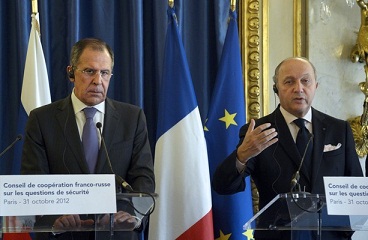Russia and France on Tuesday admitted they still had differences over how to solve the Syrian conflict ahead of a debate in the UN Security Council over settling the chemical weaponry issue.
Russia and France on Tuesday admitted they still had differen ces over how to solve the Syrian conflict ahead of a debate in the UN Security Council over settling the chemical weaponry issue.
ces over how to solve the Syrian conflict ahead of a debate in the UN Security Council over settling the chemical weaponry issue.
After meeting in Moscow, Russian Foreign Minister Sergey Lavrov and French counterpart Laurent Fabius said they had differing visions of how to proceed toward the common goal of a peaceful and chemical weapons-free Syria.
Russia also strongly rejected claims by both France and the United States that a UN report released on a sarin attack outside Damascus on August 21 placed the blame with the Syrian government.
Despite sharing the same goal of destroying Syria's weapons and holding an eventual peace conference, "we have differences over how to achieve it," Lavrov said.
He added that the UN report "proves that chemical weapons were used" but does not prove that the regime of Bashar al-Assad was behind it. "There is still no answer to the question of where the missile (used in the August 21 attack) was produced," he said.
Russia still has "most serious basis to believe that this was a provocation," Lavrov said of the attack. He called on world powers not to "play up emotions" when making decisions, but rather "rely on professionals".
Fabius claimed however that the UN report left "no doubt that the Damascus regime was responsible" for the chemical attack.
He said there was a "difference in approach" between France and Russia on the methods required to reach peace but the two sides were "perfectly agreed" on the need for a political solution.
'No Chapter Seven in Resolution'
Lavrov and Fabius met in Moscow a day after France, the United States and Britain said they will push for a strong resolution. Diplomats said France and Britain are preparing a draft that will demand a threat of sanctions if the Syrian government does not comply with the chemical disarmament plan.
Lavrov however stressed that the agreement he reached with American counterpart John Kerry Saturday meant that the resolution will not be under the chapter of the UN charter that allows the use of force.
"The resolution... will not invoke Chapter VII," he said. Chapter VII can also impose mandatory economic sanctions against a target government.
"Lavrov is not denying that there should be a Security Council resolution. As to the terms of this resolution, that needs to be discussed," Fabius told journalists after the talks.
As well as speaking with Fabius, Lavrov discussed the looming Security Council debate with British counterpart William Hague Tuesday, the British Foreign Secretary wrote on his Twitter.
The United States had threatened a military strike on Syria after declaring that the chemical attack on the suburb of Ghouta near Damascus was carried out by the Syrian government and killed over 1,400 people.
The strike however was put on hold last week as Syria agreed to a fast-track accession to the convention banning chemical weapons, formally agreed by the US and Russia in Geneva.
Meanwhile, Russian Deputy Foreign Minister Sergei Ryabkov was due in Damascus late Tuesday for talks with Syrian Foreign Minister Walid al-Muallem, the Interfax news agency said.